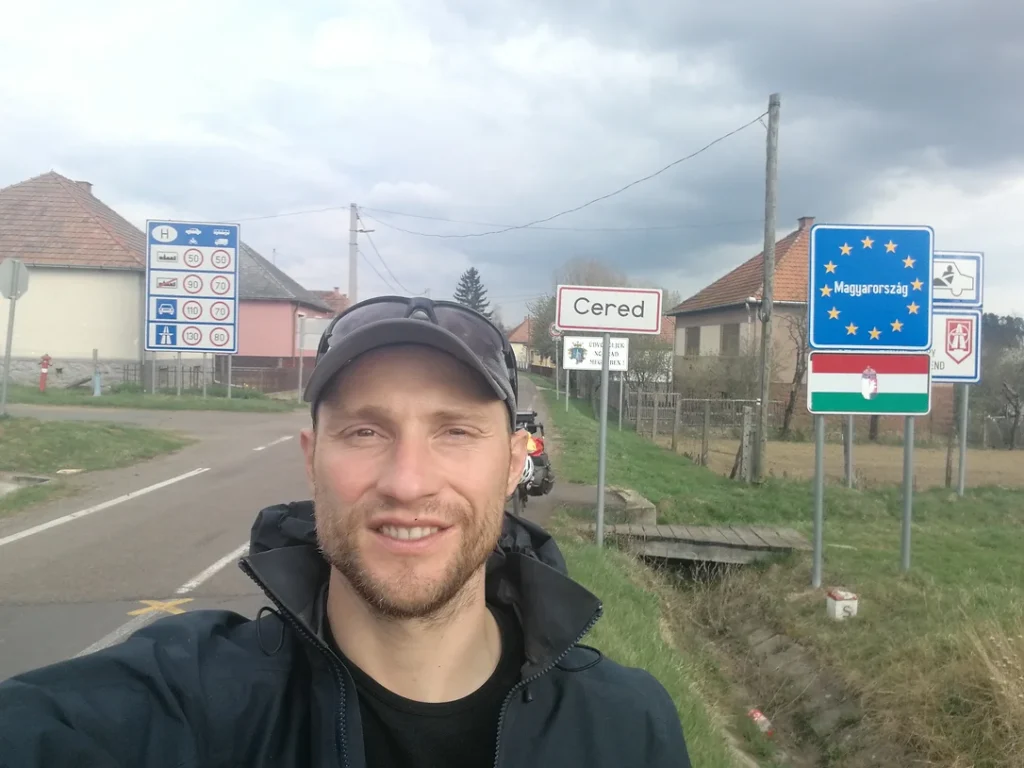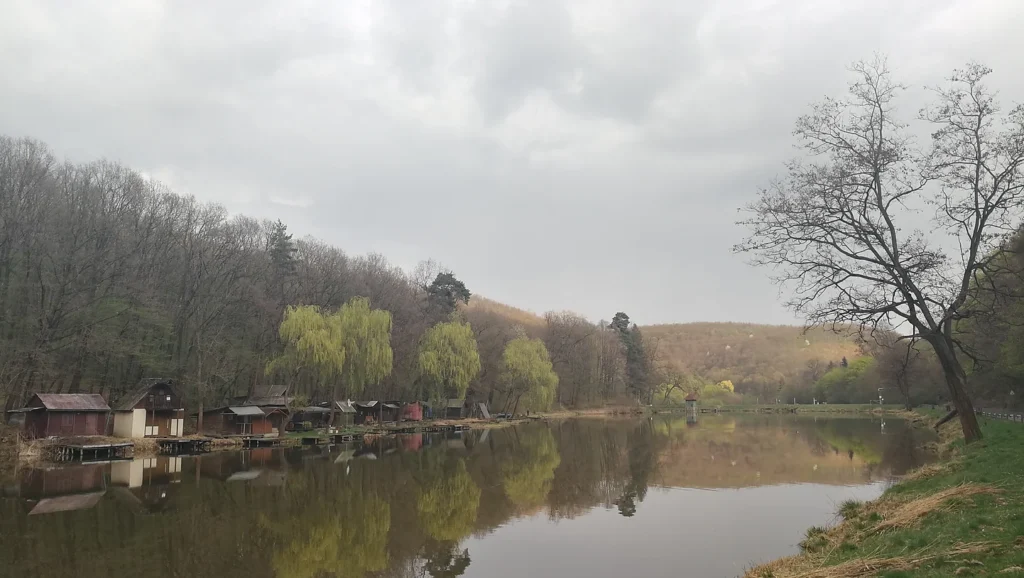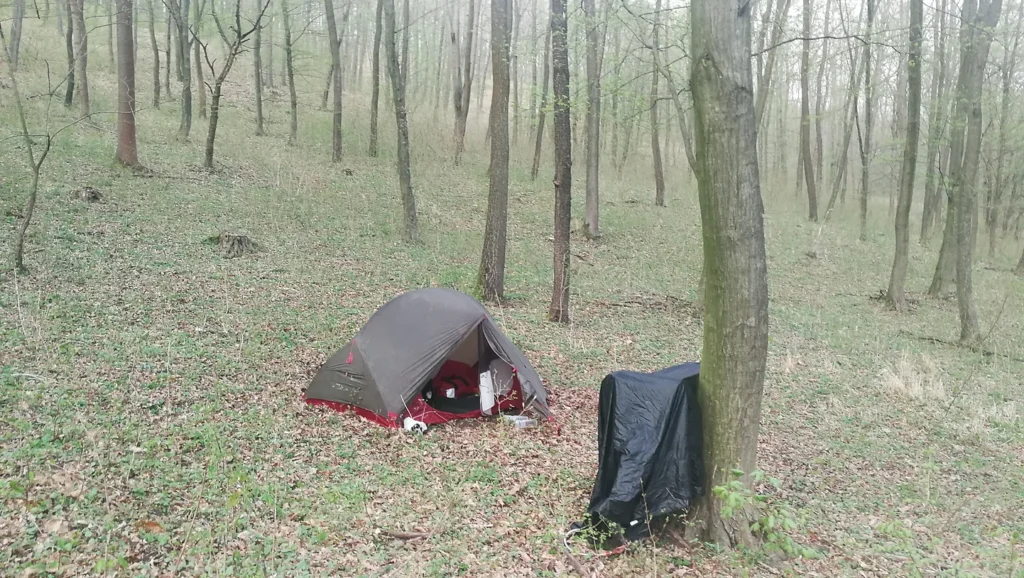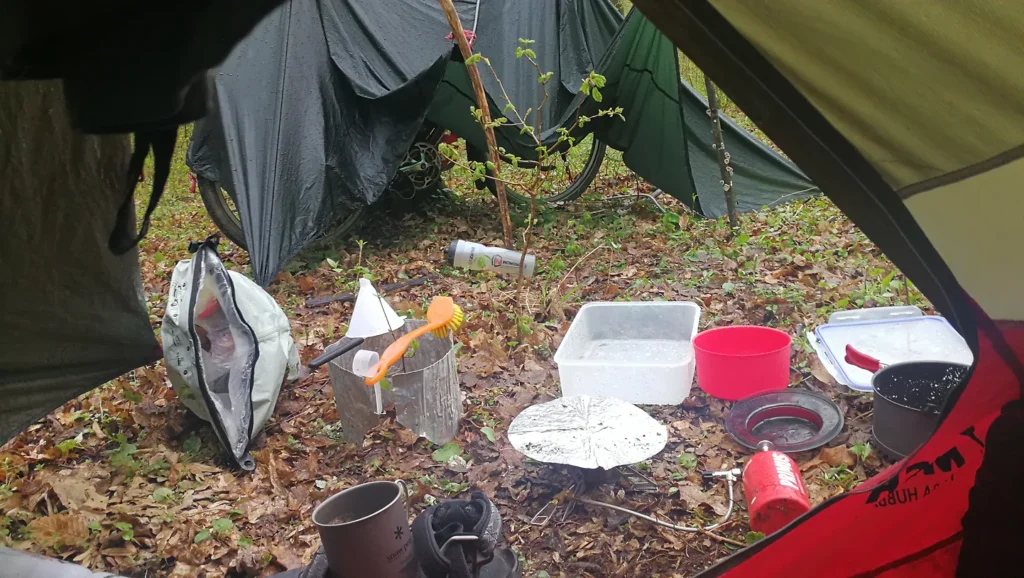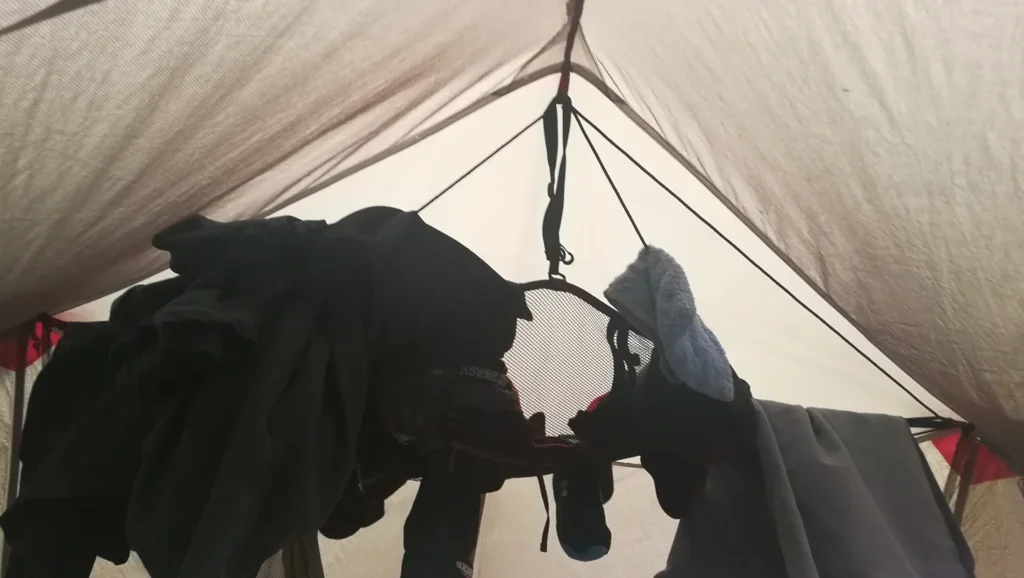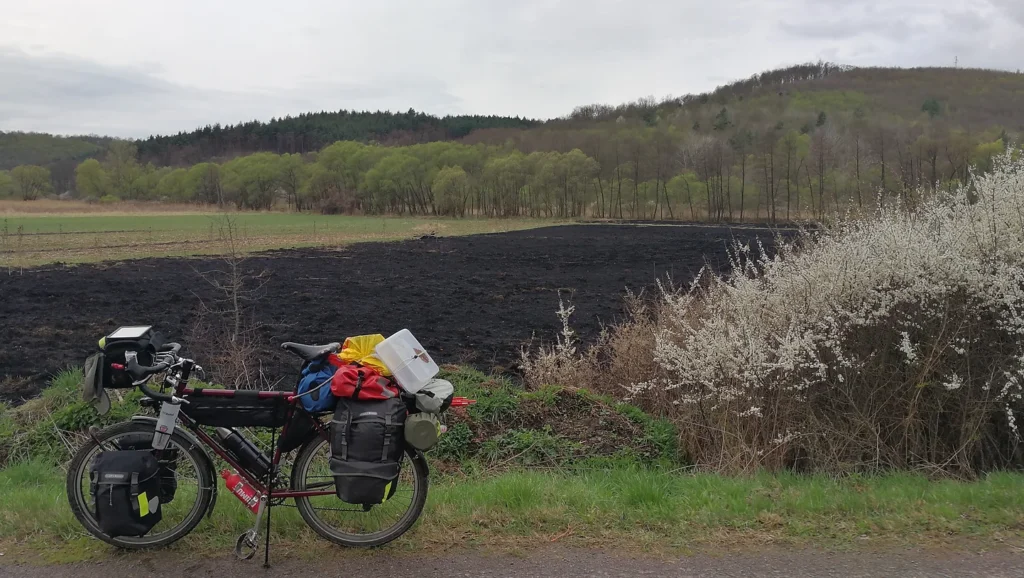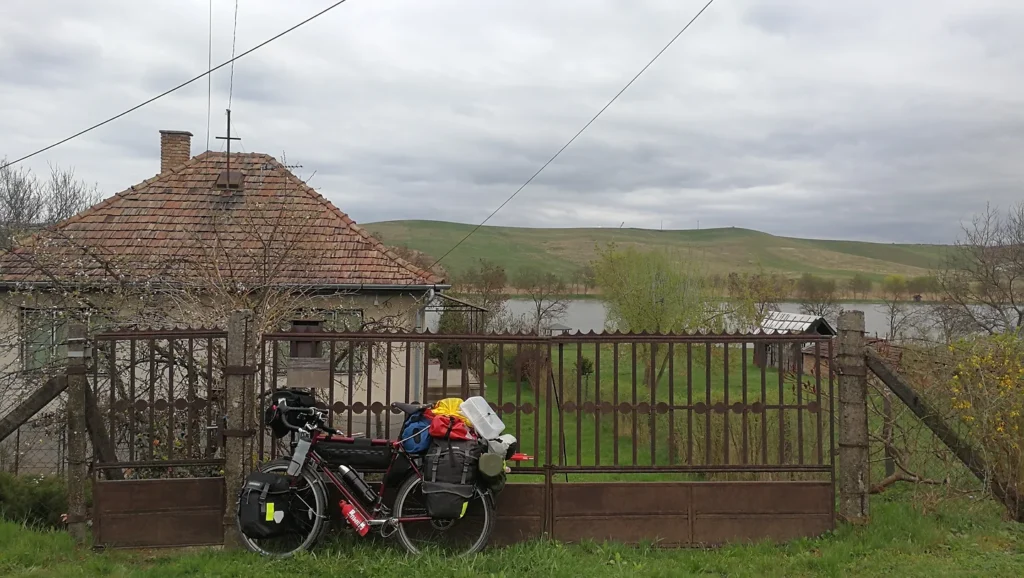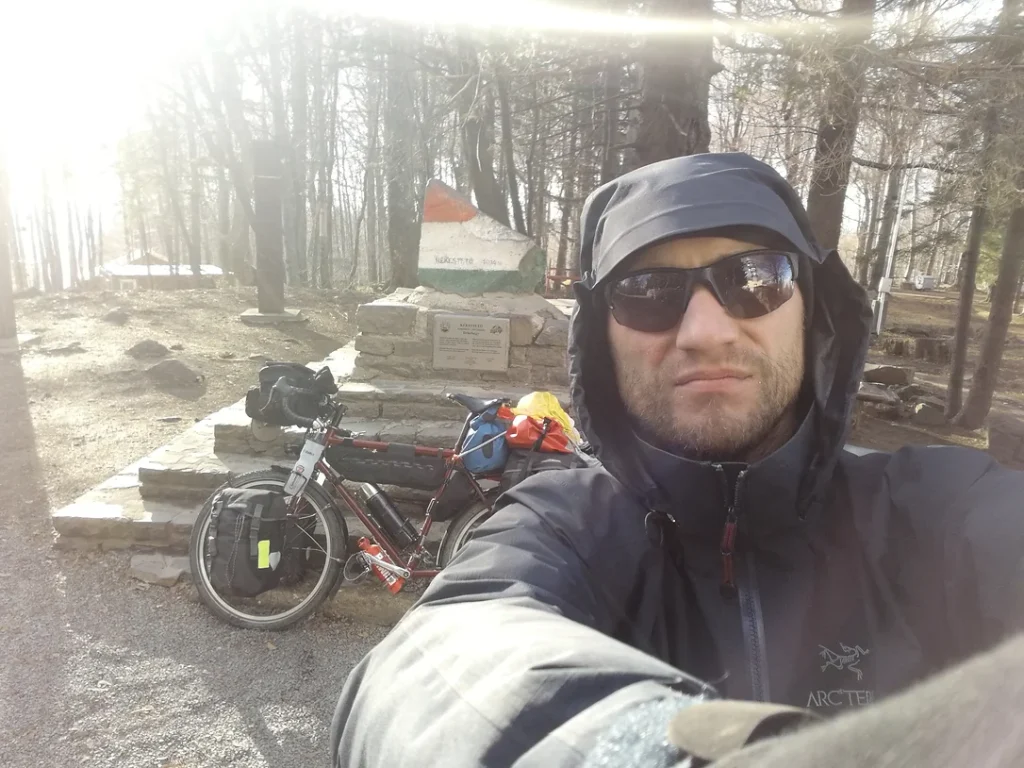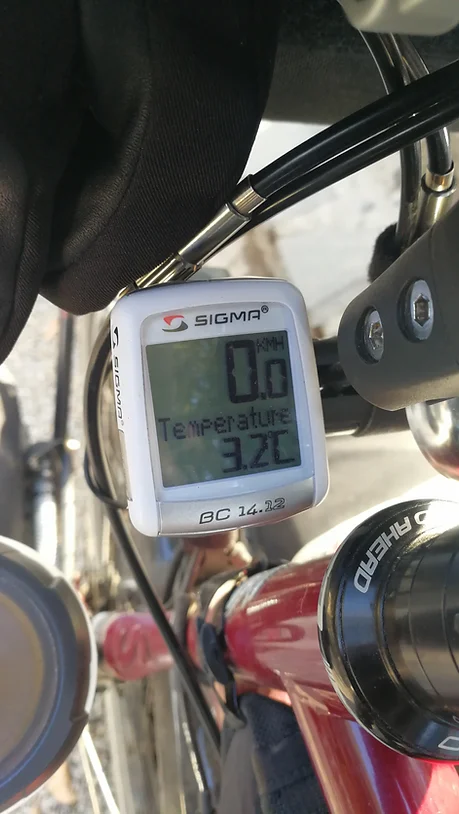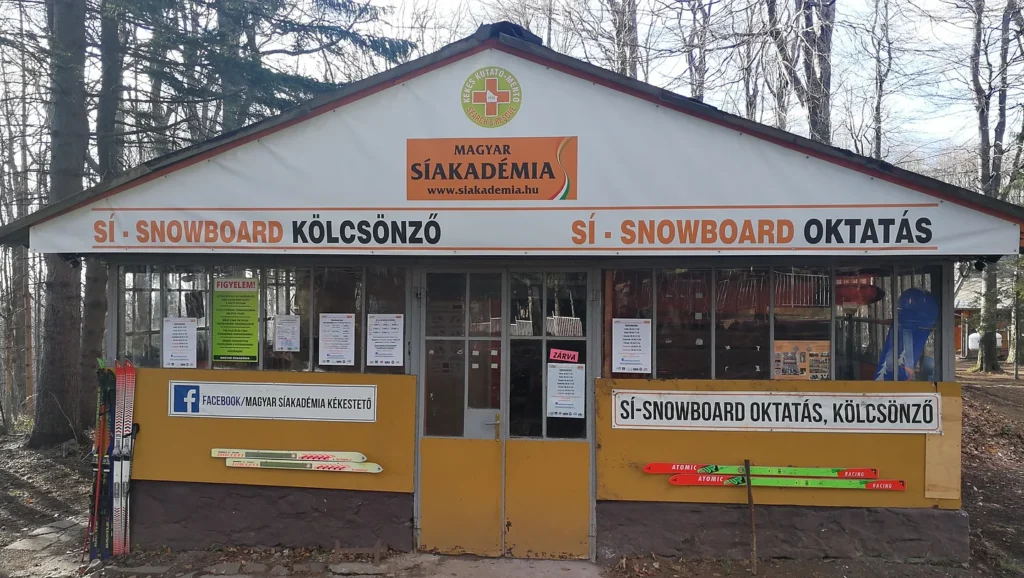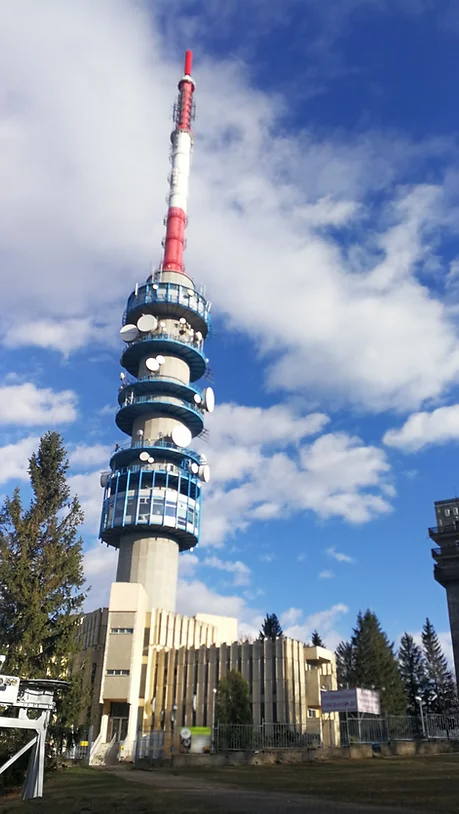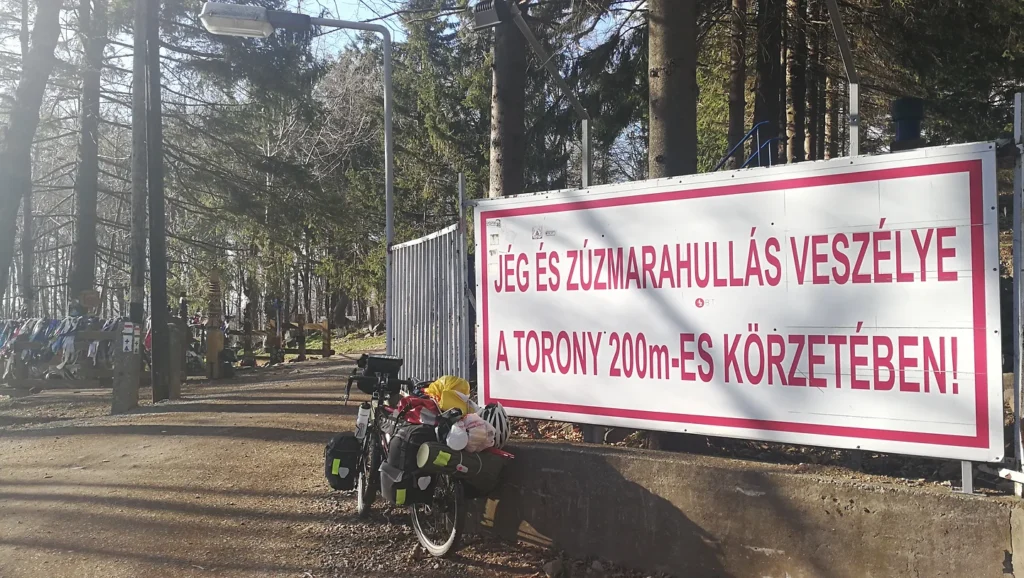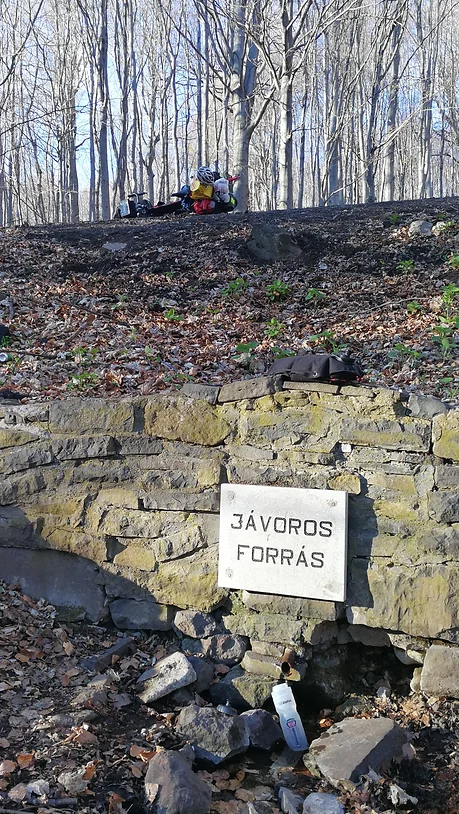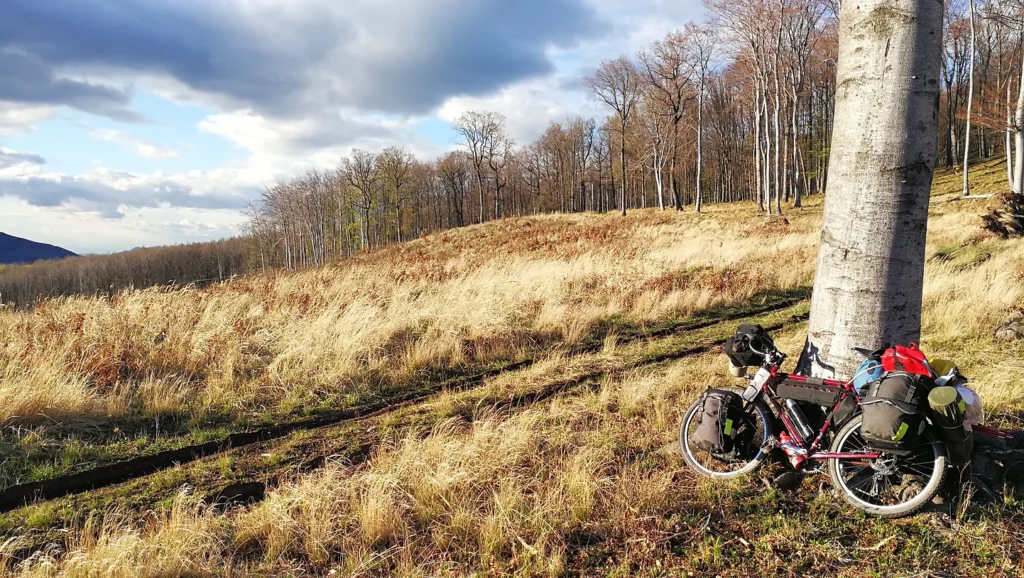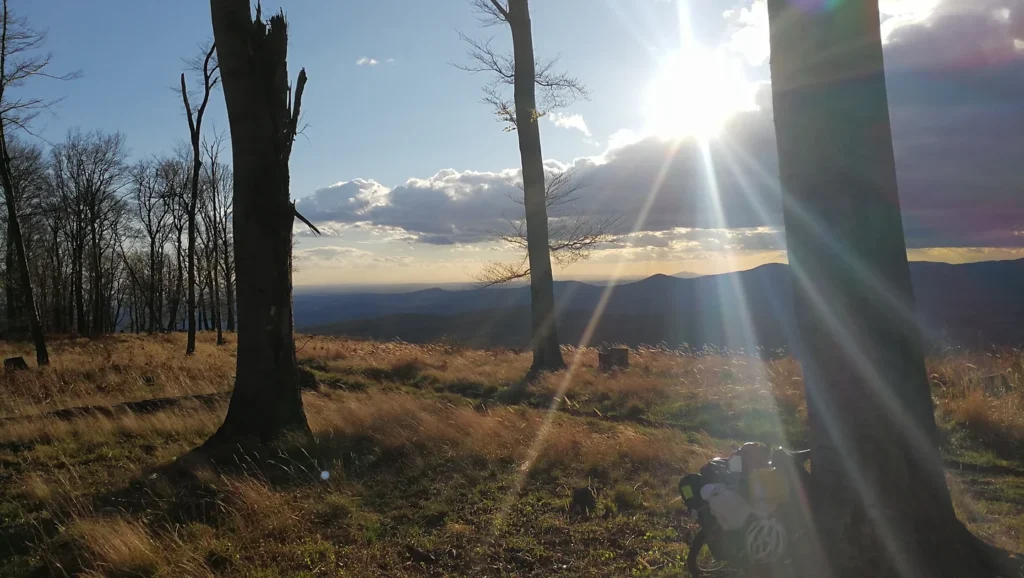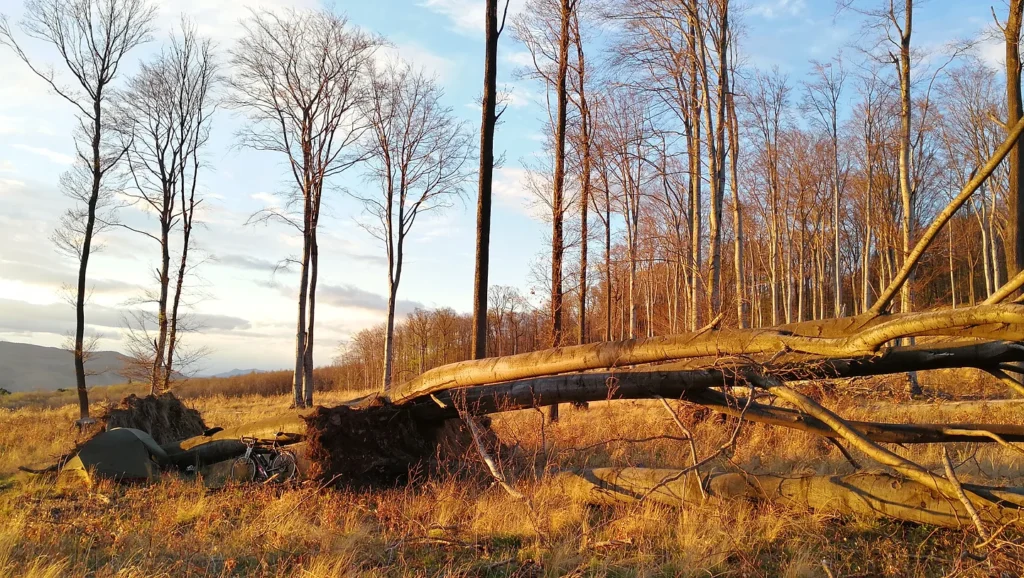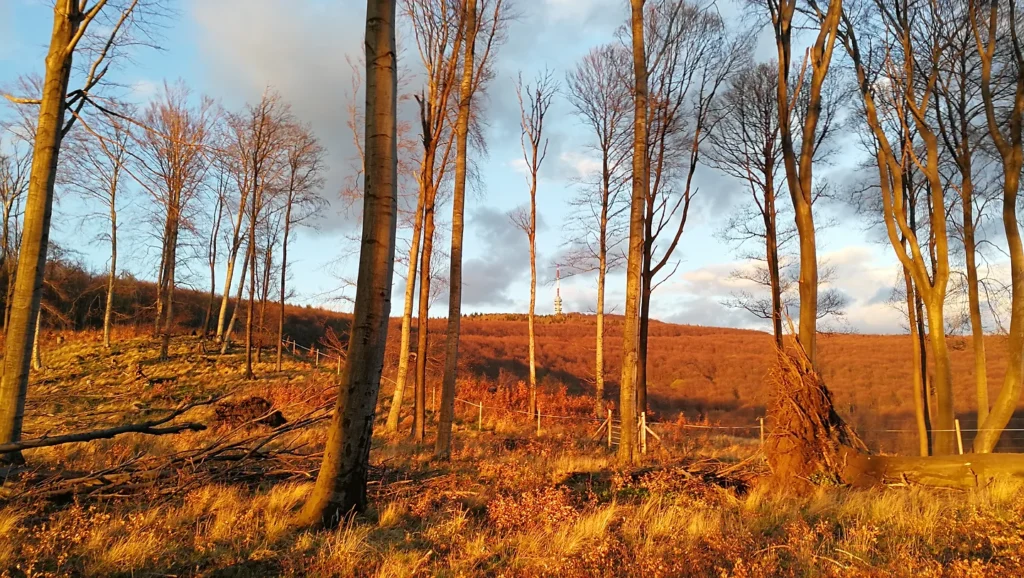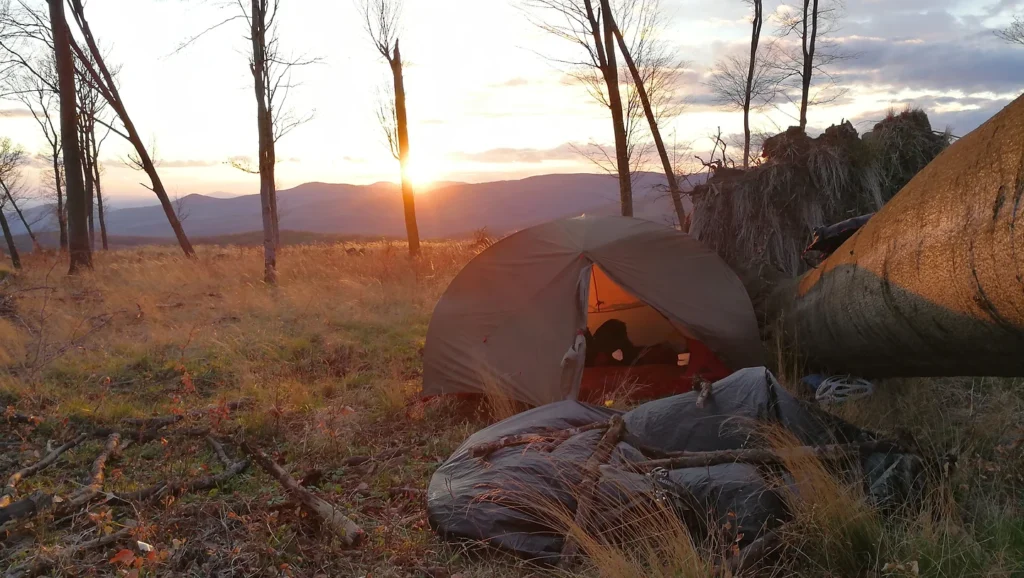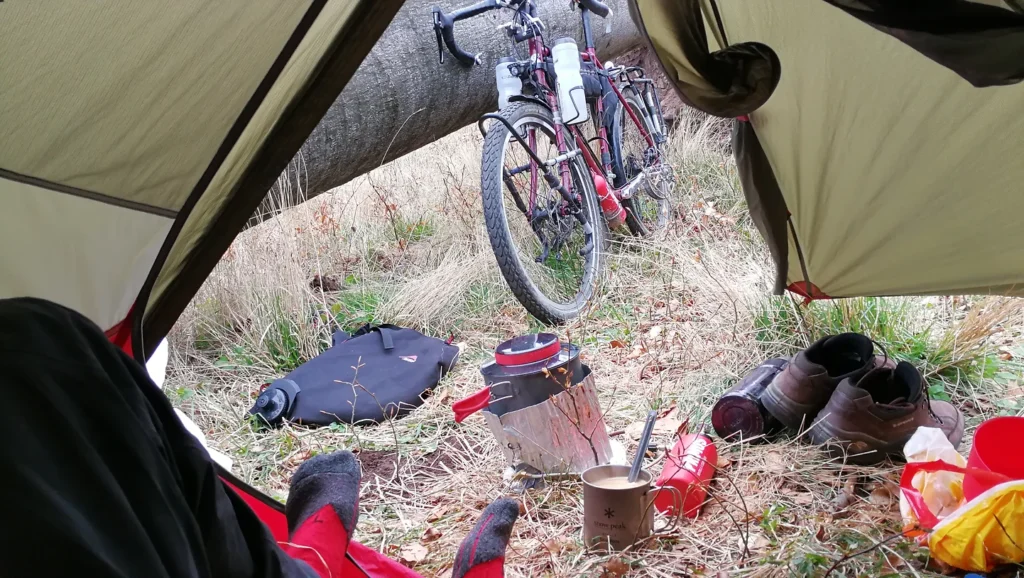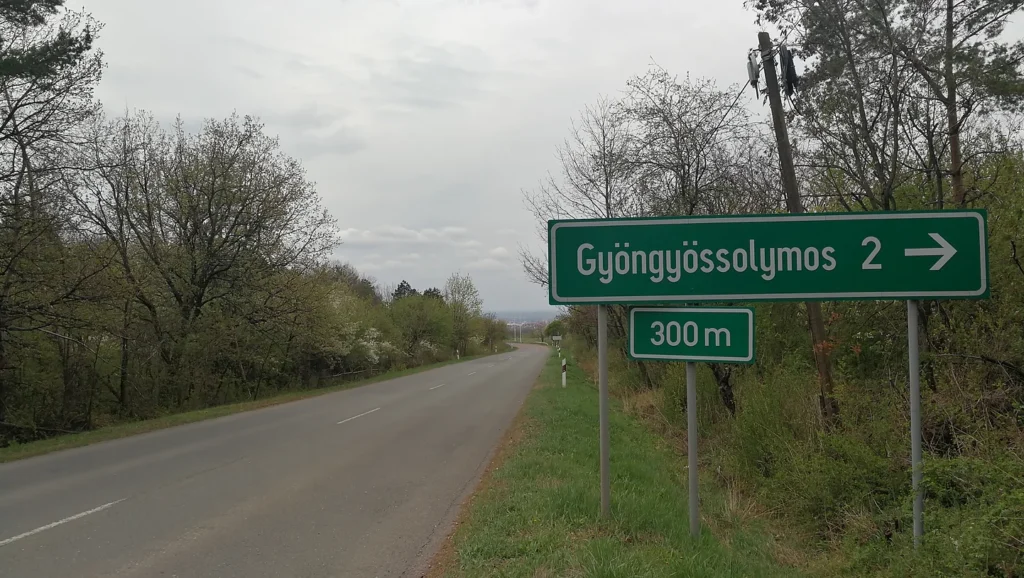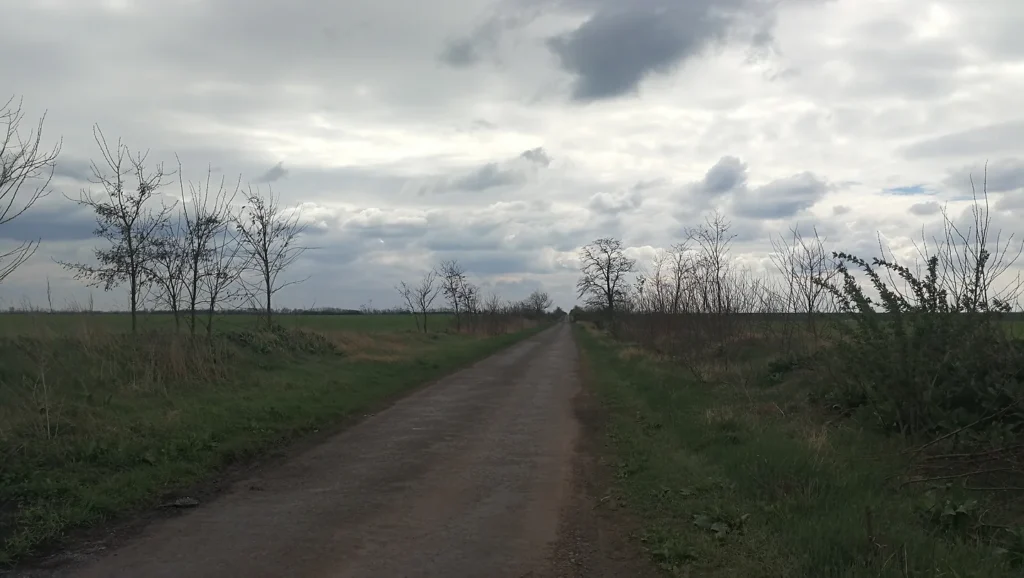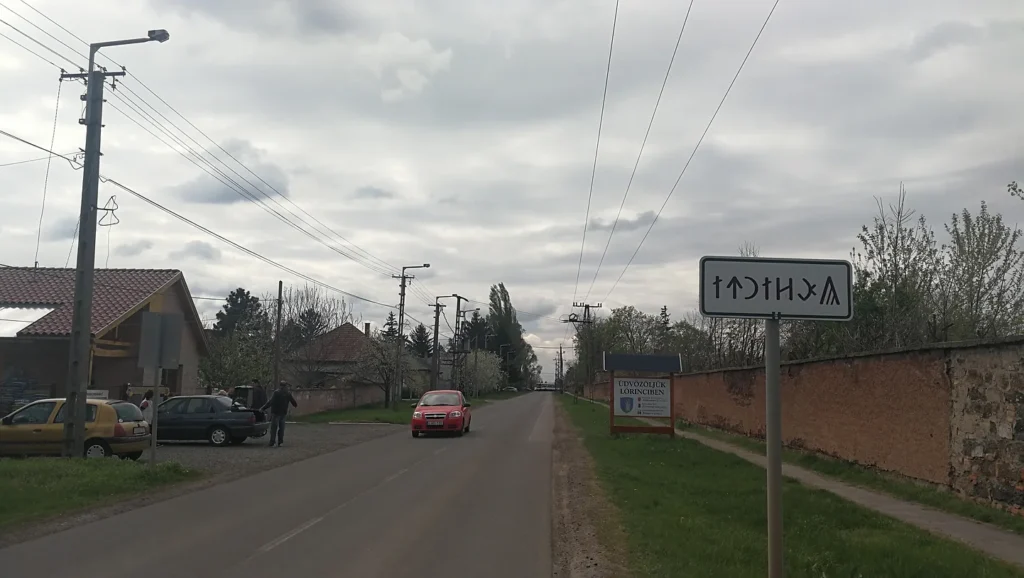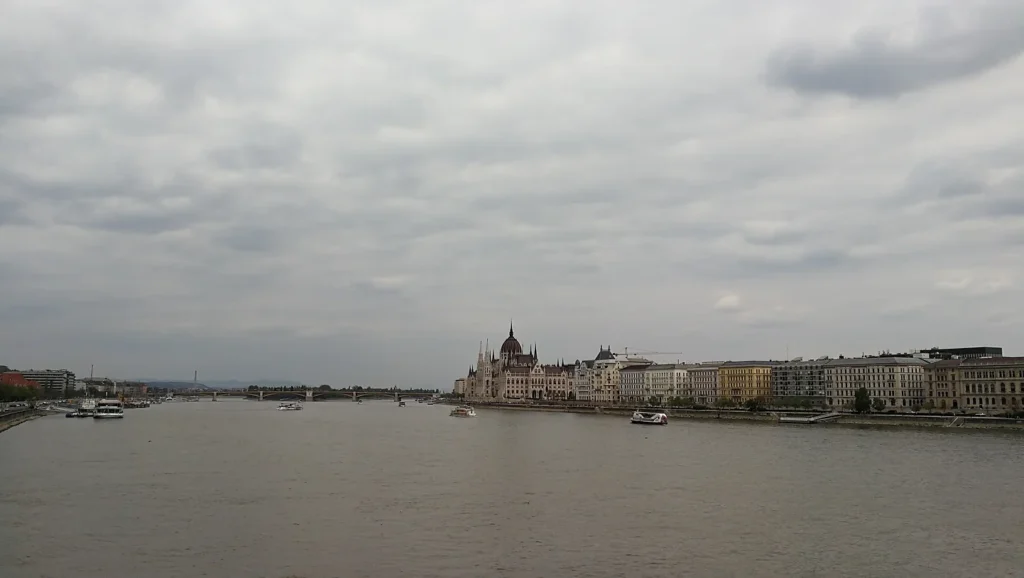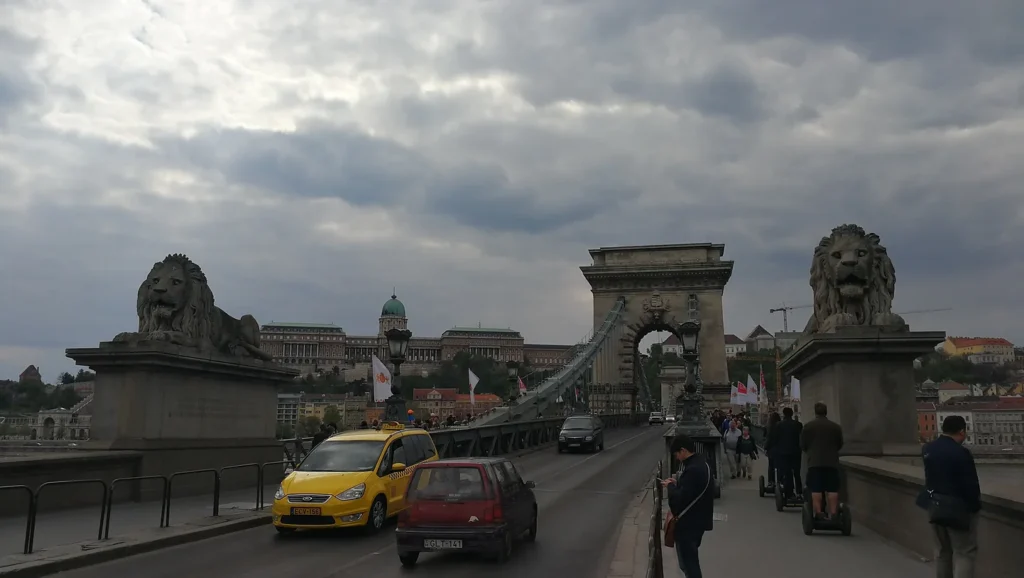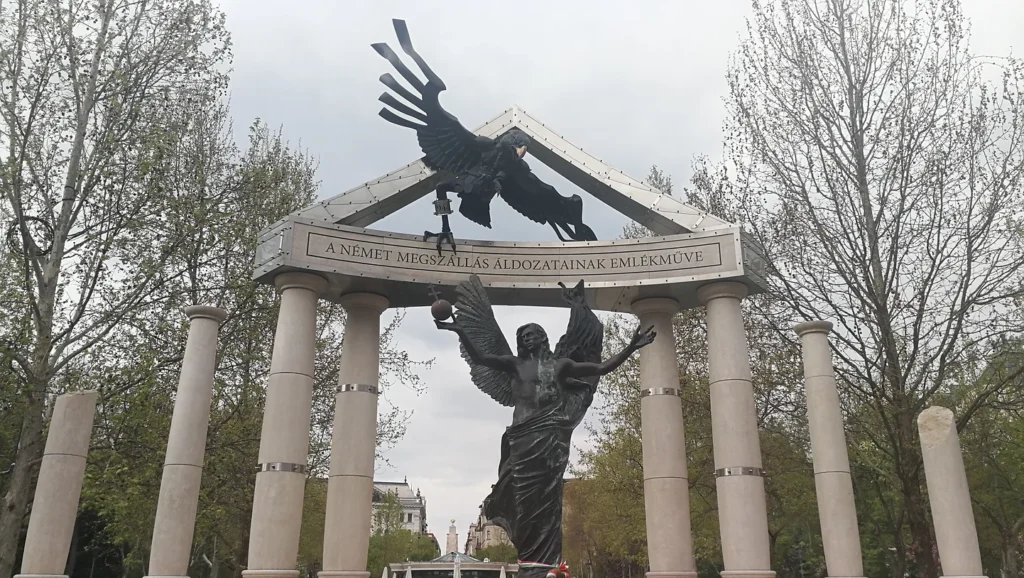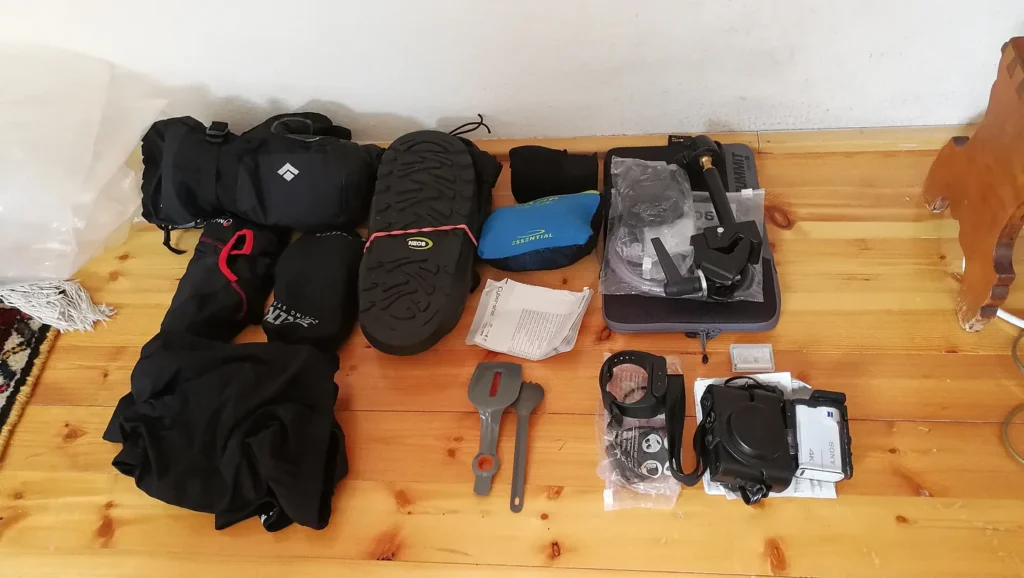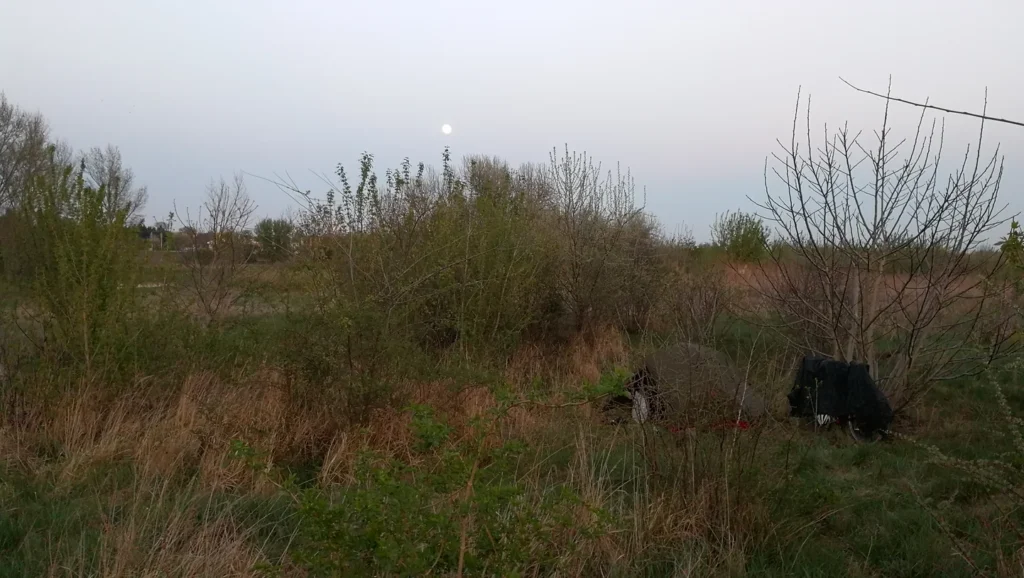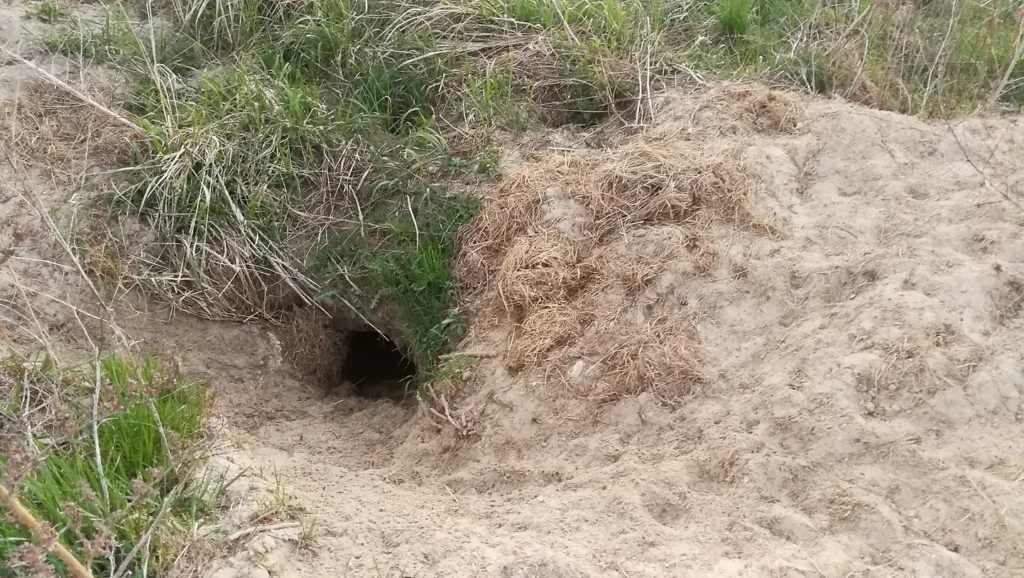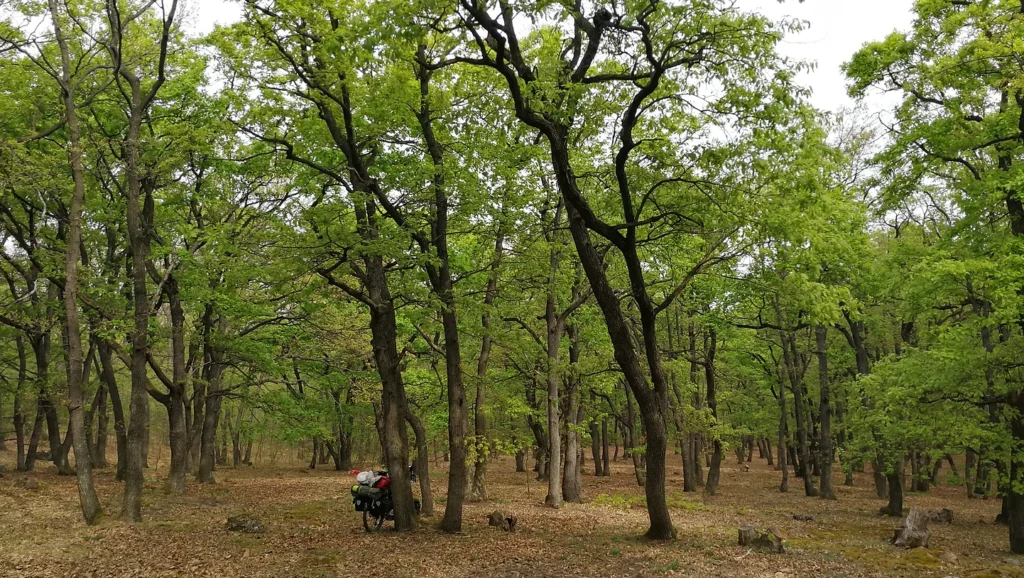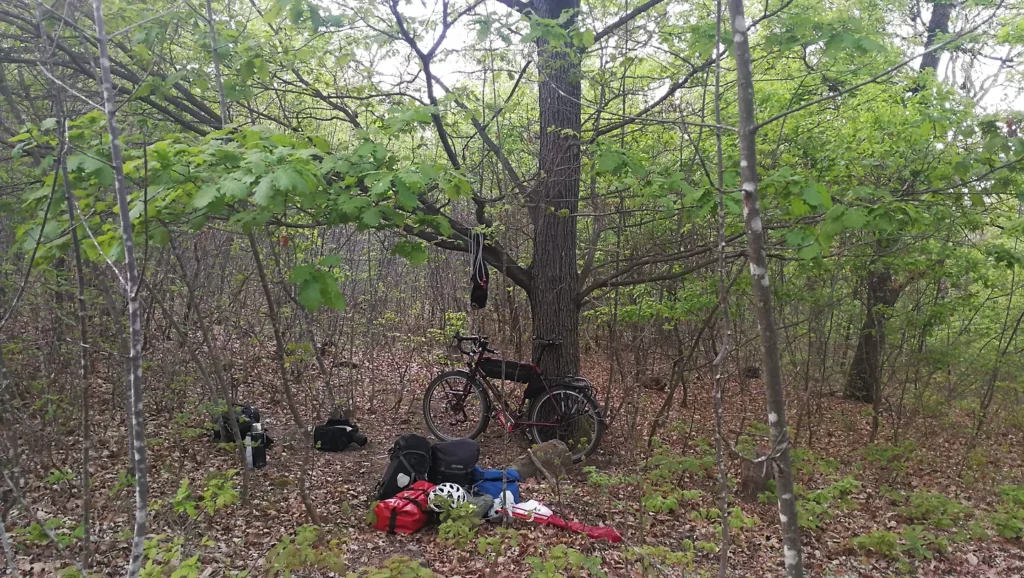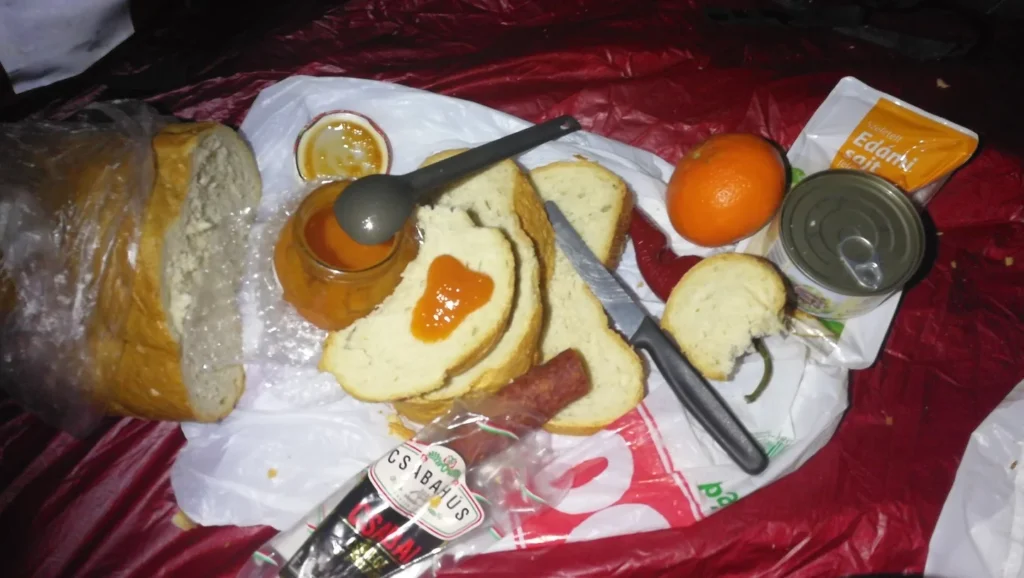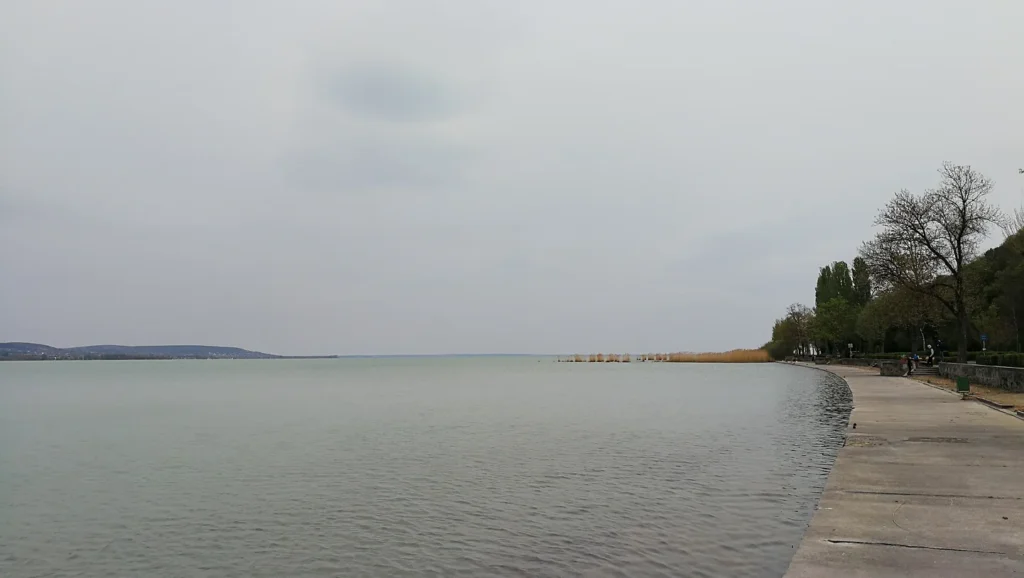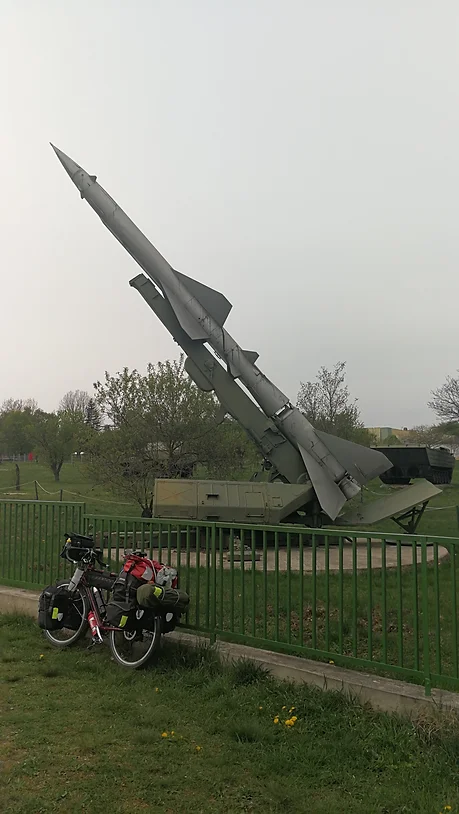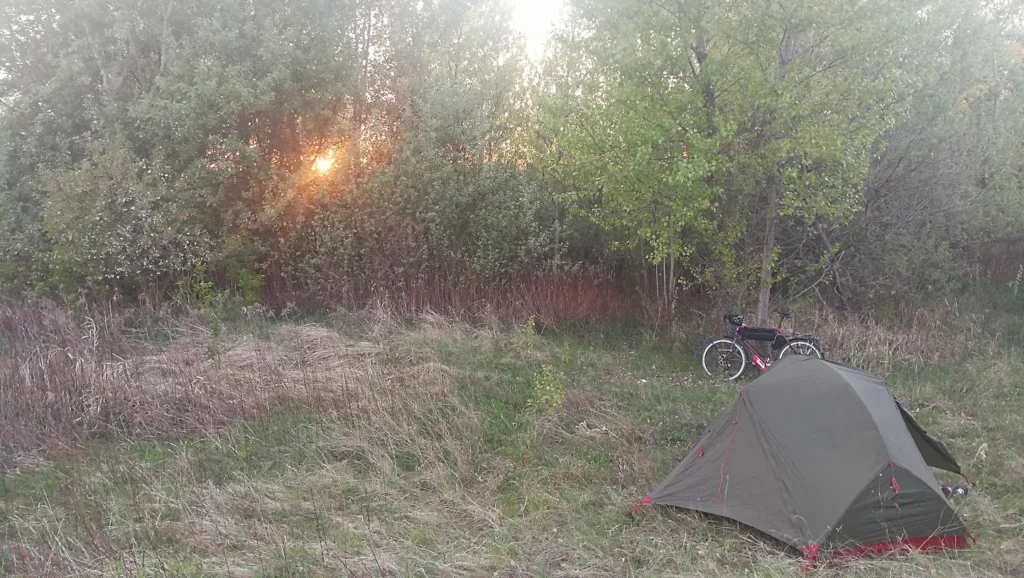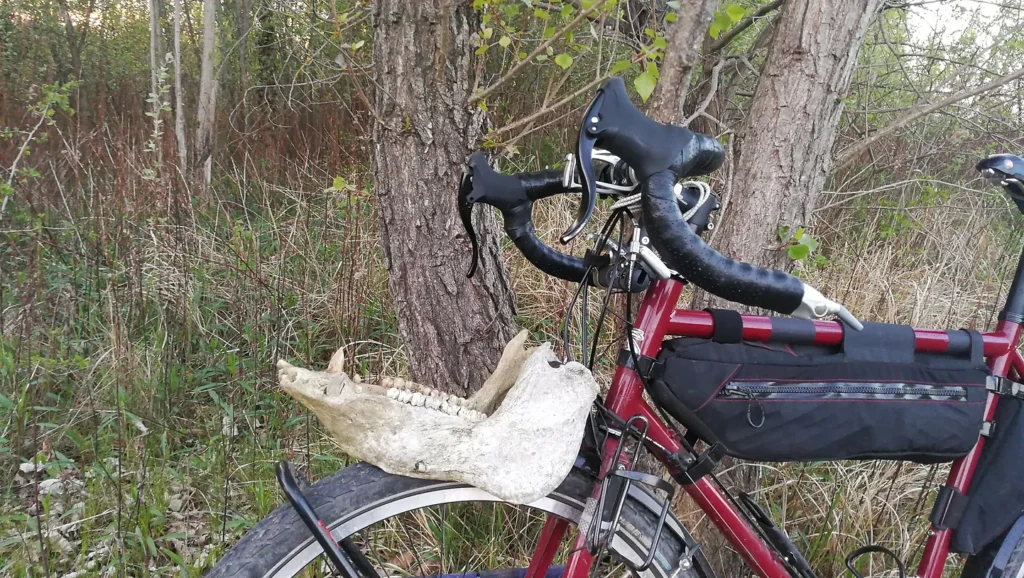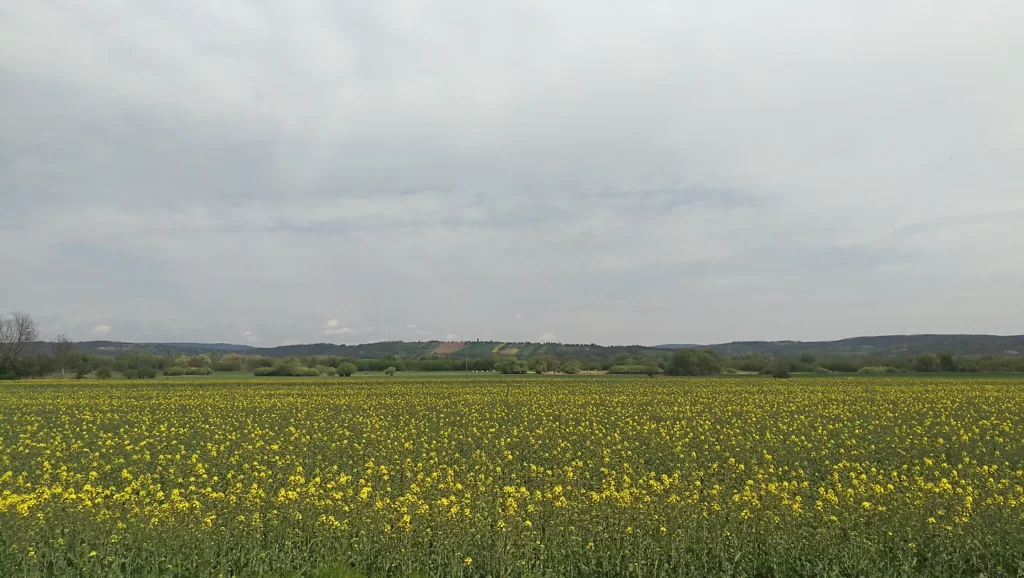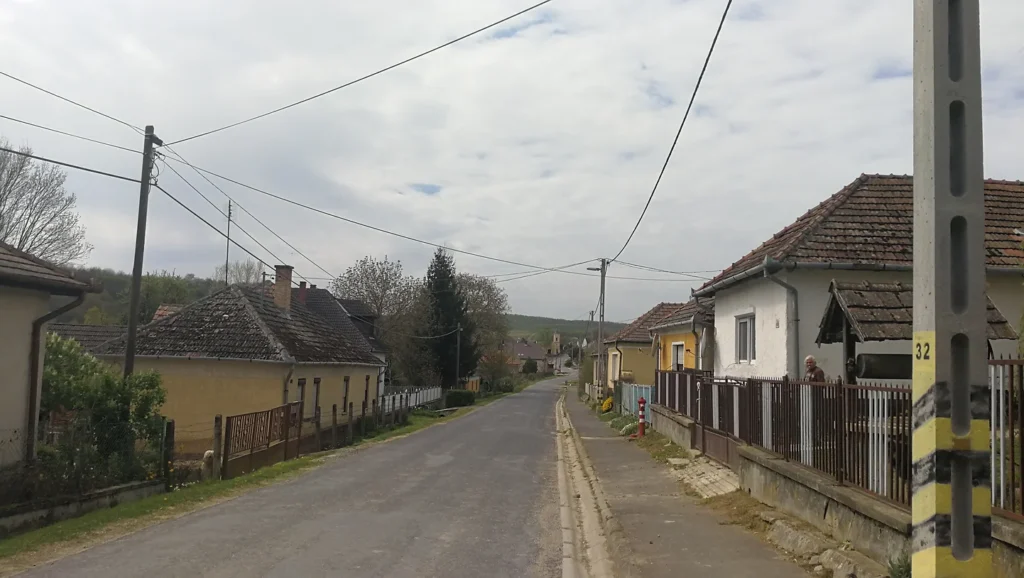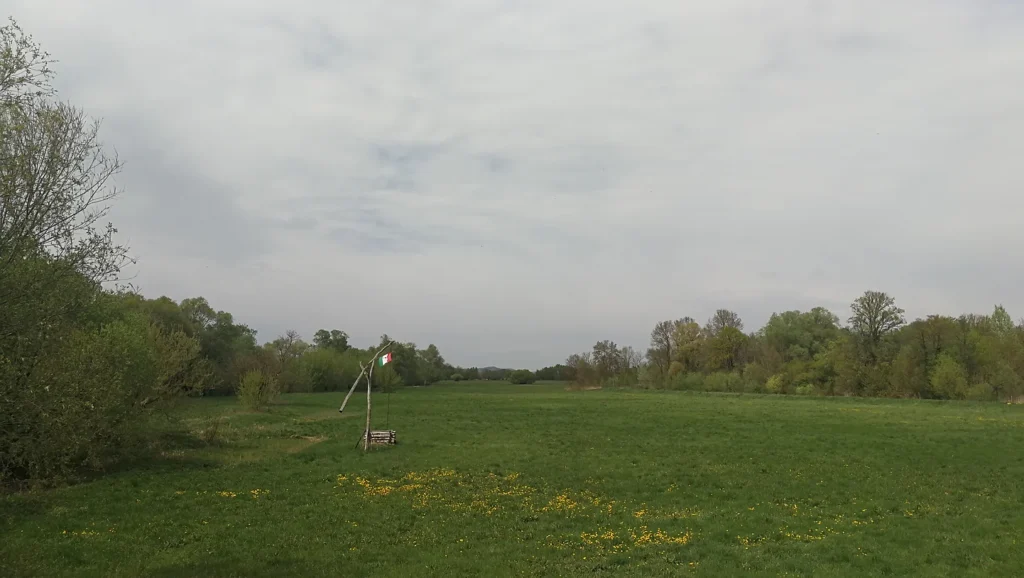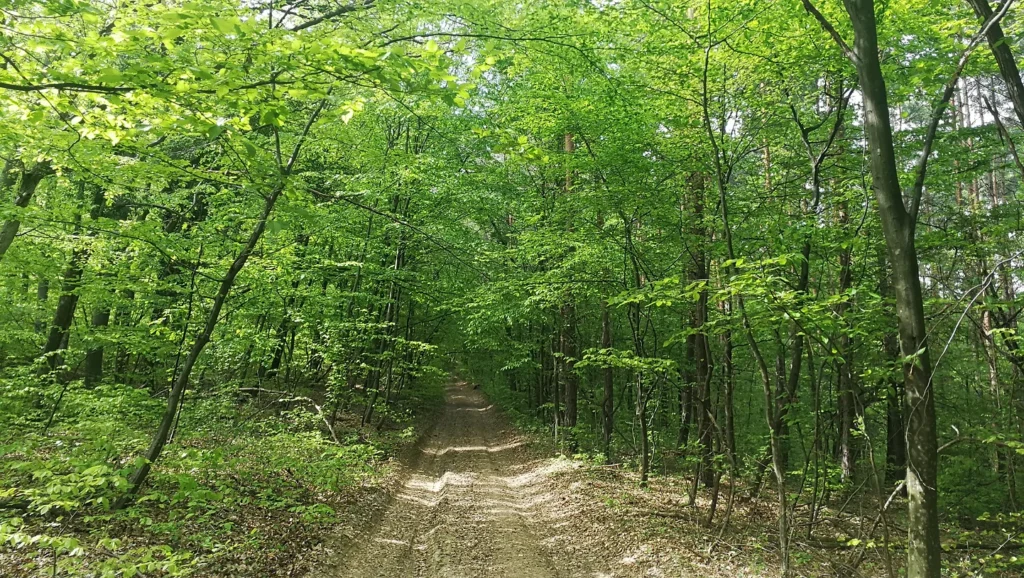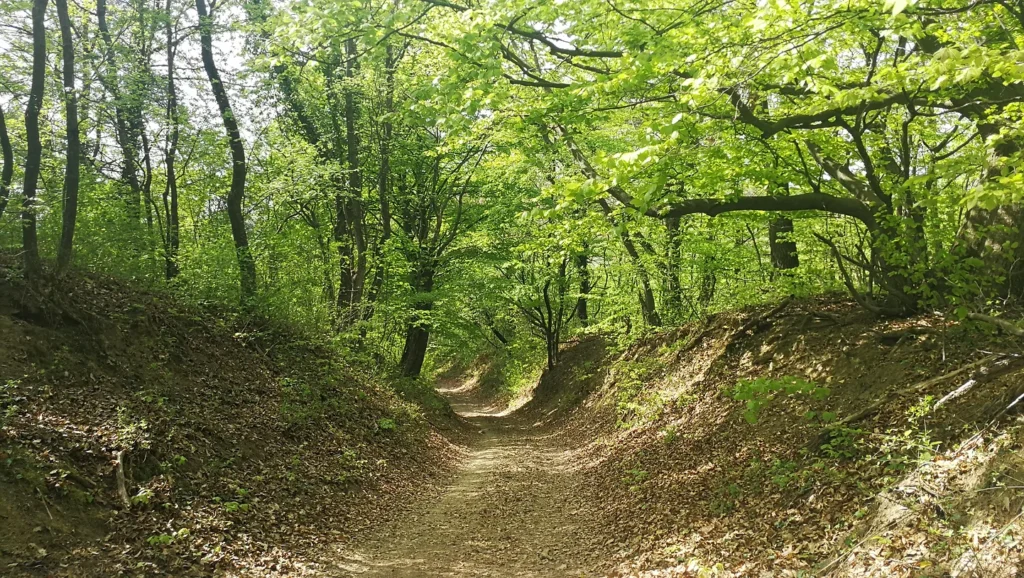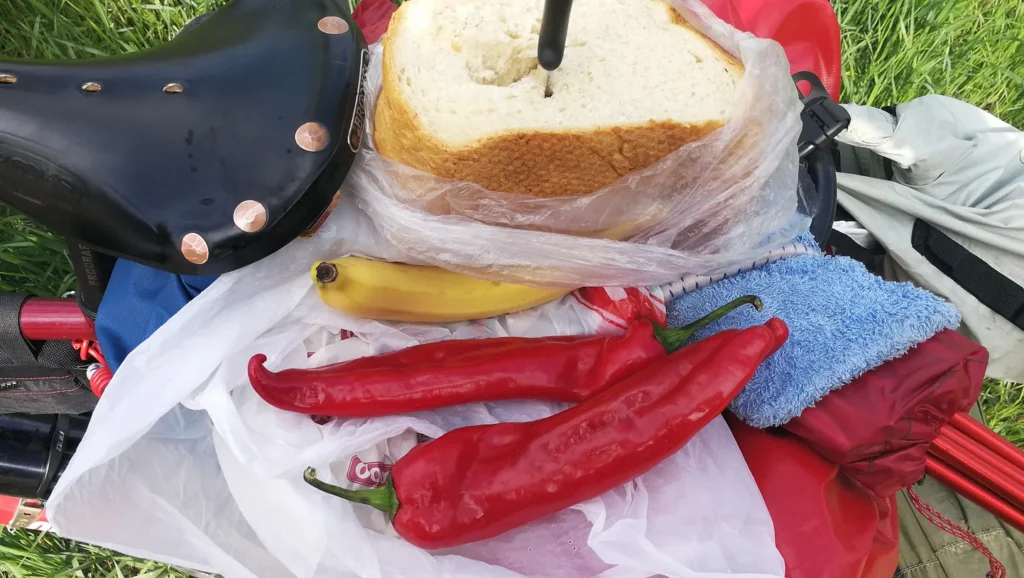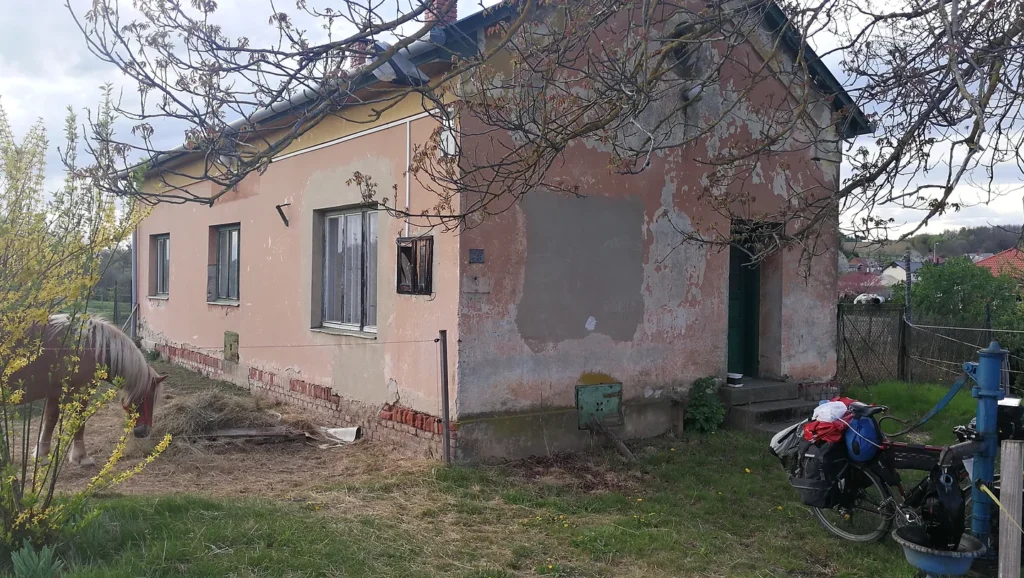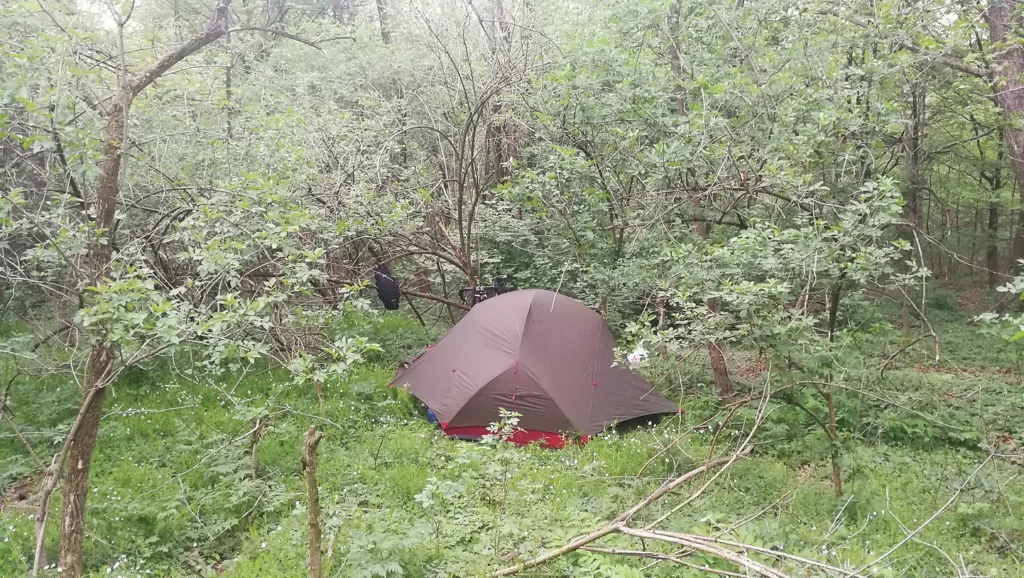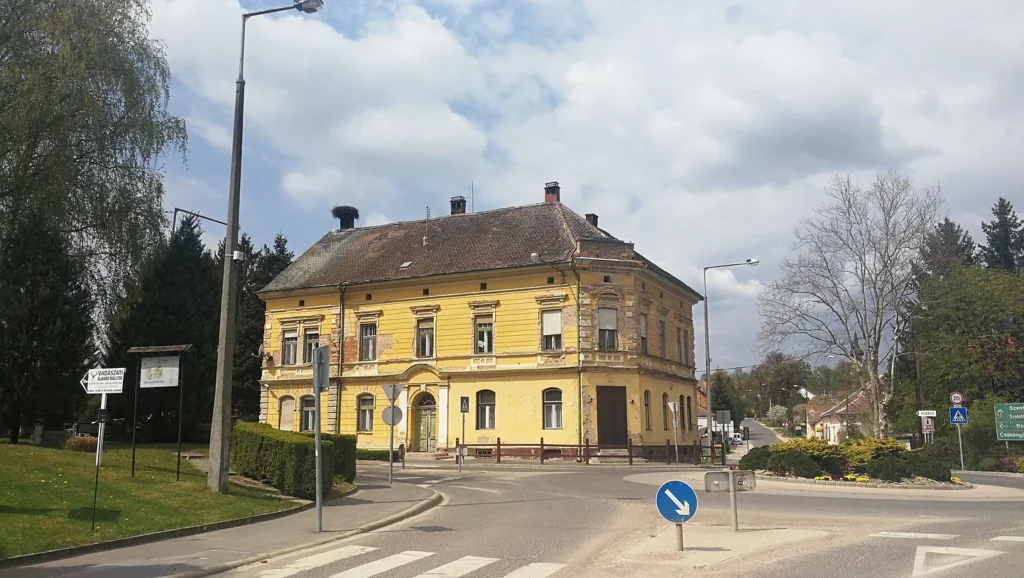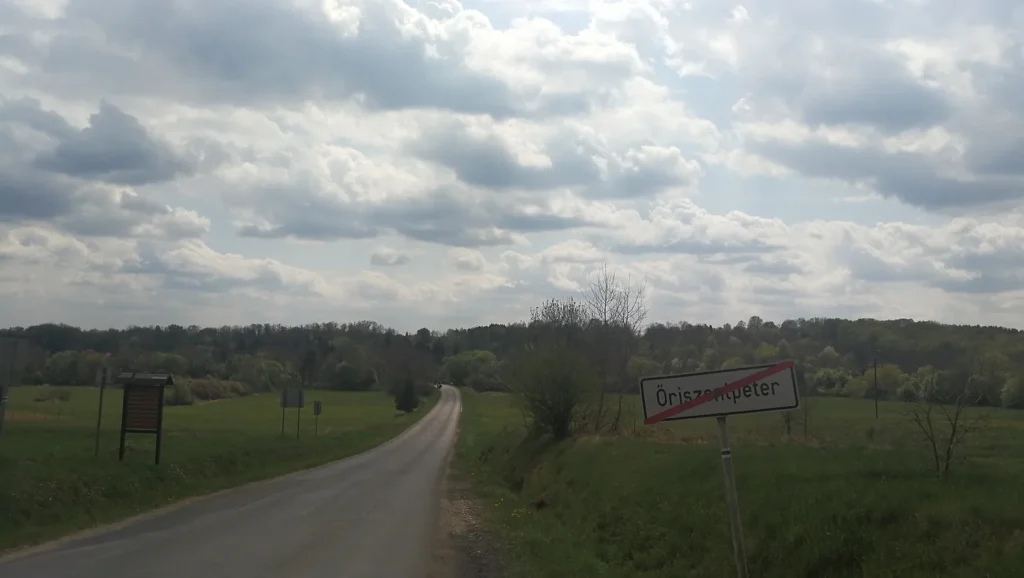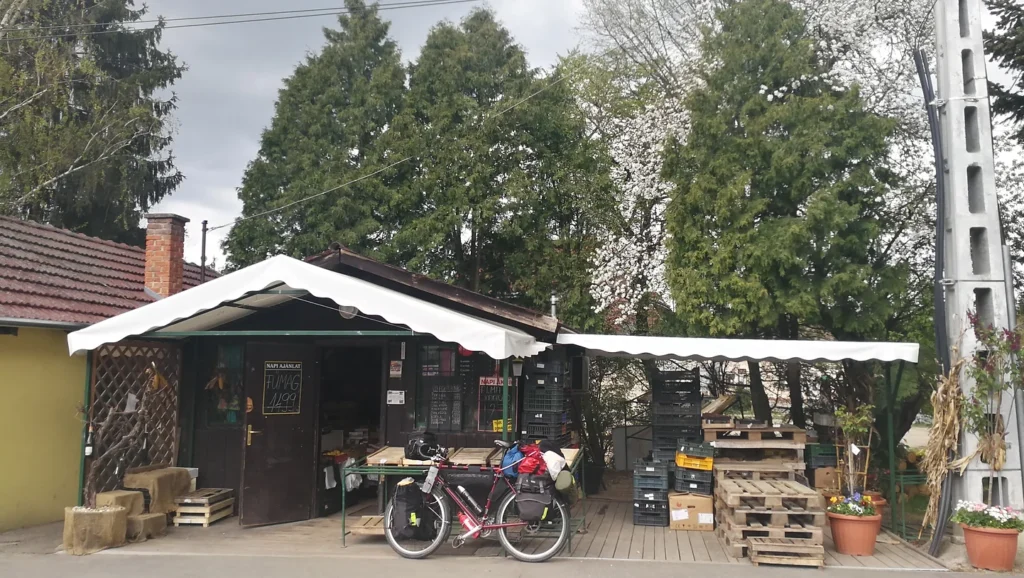Hungary — Blockades
The sleepy border crossing town made me smile – I value a lot the freedom the European Union gives people to cross internal borders without checkpoints.
For me this freedom reflects collaboration, peace, and a common orientation on larger values than nationalistic interests. I also believe this collaboration across borders makes economic sense and the joint position of EU member states on the political world stage much stronger.
Hungary welcomed me with some hills and a change in vegetation. The landscape seemed dryer and there were more conifers.
In the evening I descended into a valley where spring had already made progress judging from the fresh green leaves. The deer nearby complained about my presence but we got along well.
Last night it had rained which is really nice to listen to when sleeping. A side effect is that the cloths hanged up in my tent don’t dry well given the humidity.
I packed up camp and I rode past some freshly burned fields which I believe got burnt as an agricultural strategy. The mythical bird Phoenix would love this regenerative cycle of growth, burning, and new life rising from the ashes.
A man invited to refill my water bottles in his little house by a lake. I would have liked to stay and learn more about the local fishing club but today I had a plan requiring me to cycle on.
In Mátraterenye-Nádújfalu I started my attack on mount Kékes, Hungary’s highest peak (1,000 meters). Of course I could have cycled in flat terrain all the way to Budapest but what would be the view like from the top?
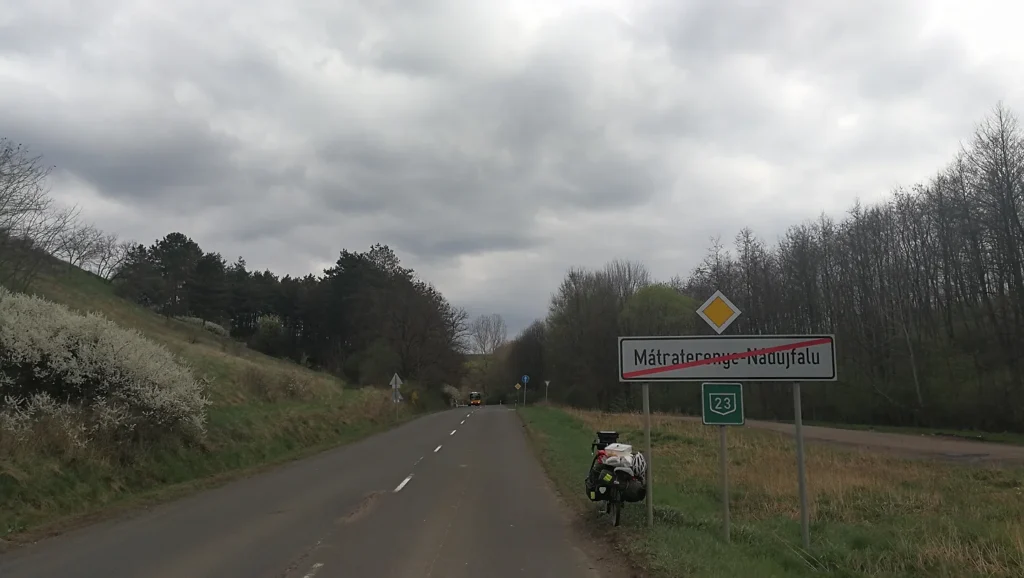
Pretty hot while ascending, icy wind at the peak. I immediately changed into dry thermo underwear and a down jacket.
At the top is a ski rental hut and a massive antenna tower. Nobody around.
Judging from the sign warning of ice fall 200 meter around the tower they must have pretty stormy days up here.
With 1.5 hours of daylight left, I started the downhill thirsty looking for an opportunity to get water while wondering where I can sleep. That opportunity came 1 minute later when I spotted a tiny water source below the road. I assume it’s Hungary’s highest spring.
Jackpot! Some days you crawl thirsty into your sleeping bag, some days you end up cycling into the dark and only find a shitty camp spot, but today was perfect. With only downhill ahead, I filled my 10 liter water bag and cruised down looking for a camp spot with a view.
Water means comfort. Once my tent is set up I usually start my camp routine by boiling 1 liter which I put in my thermos bottle. I then directly boil the next 1 liter for dinner cooking and a tea and while the second water batch is heating I mix the boiled water with cold water in my drinking bottles so that I have 1-2 liter warm shower water to properly shower myself – 1 liter is enough.
My sleeping bag and cloths stay much cleaner and comfortable that way, a camp shower routine prevents infections, and psychologically it has a rejuvenating effect: after a camp shower and a big dinner I always feel fantastic in my body.
After dinner I use the remaining boiled water in my thermos bottle to clean my cooking equipment which gets much cleaner this way, and make myself another tea to re-hydrate. The next morning having several liters left enables cooking breakfast and tea, another cooking equipment cleaning, and starting into the cycling day with already filled water bottles.
With the view over central Hungary in mind, I first tried to camp directly on the ridge but the storm was too strong as even with all used tent cords my tent got bowed down by the gusts.
I wanted to stay close to the ridge so I searched shelter behind the trunk of a fallen tree.
Mount Kékes was shining in a golden light in the evening sun while the storm howld – woah!
The wind stayed stormy all night which is pretty loud when you sleep in a shaking tent.
Here is the thing with our emotional life compass: I guess it sometimes gets stuck a little bit when we have emotional blockades.
In my subjective view on the human existence, that’s fundamentally normal for all of us and ok. I believe the game of life you and I and we all play is to navigate our life path with navigation tools having boundaries – both cognitive and emotional.
Anger, hate, resentment, disappointment, shame, sadness, and fear – we all have such emotions and for a good reason. But sometimes we block those teachers when they demand inner growth.
Happiness, trust, love, meaning, belonging, fulfillment, and purpose – we all have such emotions too even so we sometimes don’t feel them when we don’t give them space.
Emotional acceptance is what we all need to live our life true to ourselves … but subconsciously we run away from it. After having worked for decades as a psychoanalyst Carl Jung concluded:
“People will do anything, no matter how absurd, in order to avoid facing their own souls.“
Perhaps some people even go on a bike tour and camp in a storm to avoid facing their soul? But then again that’s perhaps where you find it.
Breathing in, breathing out.
A new day, a new beginning! Do you also sometimes wonder what your consciousness has been doing while you were asleep?
I started the day with a refreshing downhill and then cycled from mount Kékes to Budapest. I stayed on small countryside roads until close to the capital but route navigation can be tricky in the countryside when places sound similar.
Did you know the towns Gyöngyössolymos, Gyöngyös, Gyöngyösoroszi, Gyöngyöstarján, Gyöngyöspata, and Gyöngyöshalász all lie close to each other south of mount Kékes?
The strong west-wind I experienced last night stayed with me all day as a headwind, sometimes cutting my average speed by half. This was a tough day in the saddle.
In Budapest I stayed for 3 nights with the parent’s of a friend. On my first day here I did some bike and equipment maintenance. On my second day I explored Budapest.
The city name stems from the western hilly part “Buda” and the eastern flat part “Pest”, connected by the Széchenyi Chain Bridge.
A war memorial caught my attention. The memorial got erected overnight in 2014 and shows an eagle representing Germany attacking Archangel Gabriel, a symbol of Hungary. Apparently this monument is controversial with critics saying it tries to absolve Hungary from responsibility by attempting to distort Hungary’s role in the holocaust horrors.
Budapest also gave me time to reflect. Before the tour I had imagined that overcoming “boundaries of language” would be easier living on the bike due to several factors.
Solitude: While I believe in everyone’s life there are necessary times of human connection, being alone for a long time probably contributes to inner clarity. On this tour I would be alone for thousands of hours.
Nature: I think extended periods in nature allow us to reconnect to our body and emotions. Call it what you want but somehow mother nature helps us to become more balanced.
Diversity: A long bike tour means living in a constant stream of new landscapes, cultures, and climatic conditions. I believe such rich situational diversity supports us in feeling who we truly are given the diverse self-reflection opportunities.
People: Complementing the aspect of solitude, a bike tour also means constantly meeting people of other cultures. I believe such intercultural encounters and spending time with people living very different lives than we in our home bubble are an opportunity to contrast values and learn from each other.
Being offline: Camping alone in the forest with or without a mobile device connected to the internet makes a big difference regarding the relaxation and mental clarity that emerges over time. I had taken the decision to cycle largely offline and to also not bring any offline media content to consume (e.g. podcasts, books). For the navigation I had downloaded offline maps.
In Budapest it was to early to judge whether these factors I had imagined before the tour were truly helping me to overcome language – but I did have two equipment related realizations.
First, I had brought a small laptop with the idea to work on the book during the tour. Forget about it … when you cycle and wildcamp your day is full. I also realized a laptop brings back a cognitive focus and thereby the exact boundary of language I wanted to overcome.
I didn’t want to be cognitive-analytical. I didn’t want to be online. I left the laptop in Budapest behind having it used once.
Second, I had brought an action cam and a camera. The number of video minutes I had recorded since Berlin was zero. The number of pictures I had taken with the camera was four. I just didn’t feel like using them and didn’t want to push me just because I had brought them.
I didn’t want to be electronics focused. I didn’t want to generate much media material. I decided my cell phone was sufficient and thus I left both the action cam and camera behind.
On the one hand I felt naive. I had made wrong assumptions about who I would be on the tour and had invested in electronics I now left behind unused. On the other hand I felt more free.
Together with the action cam I also dropped a solid mounting system designed to shoot stable video footage while cycling. I bought it inspired by a cyclist making awesome videos like this … watching it before my tour made me hungry to go out for an adventure myself.
I further decided to leave behind a pair of thick gloves, a facemask, snow googles, and a pair of foldable overshoes. I still expected snow days in the Balkans and Himalaya region but this winter equipment seemed overkill and I decided I would just take the risk to be fine without it.
Altogether this was a big cut in equipment weight and volume.
I left Budapest fully recharged and breathing more freely. Everything you possess also possesses you.
Like before Budapest, I cycled again all day into headwind until I was exhausted and pitched camped next to a badger hole.
More direct headwind all day, partly so strong that riding was no longer possible. I took cover behind an abandoned farm building with a strong smell of rotten animal in the air but it was the only wind cover in miles of otherwise flat and exposed terrain.
In the evening I reached lake Balaton and pitched camp in a beautiful oak forest.
While setting up my tent a group of wild bore came by. I would estimate the big ones weighted well above 100kg.
Where do our emotional blockades come from?
At first glance it doesn’t seem smart to have them. Our emotions enable us to take decisions in situations we can’t fully analyze cognitively, they help us to react faster, they are central in communication with others, and they allow us to develop wisdom. So why give up those benefits?
Perhaps it’s less a conscious choice we make than something happening automatic and subconsciously inside us. Who knows how our consciousness works – do you?
I don’t but in my view there are probably three common factors leading to emotional blockades.
First, a chronic disconnection of our mind from our emotions.
We all make structurally the same life journey from our birth to childhood to adulthood to our death. As infants we don’t cognitively “think” much about other people’s judgments … but becoming adults generally means we become more cognition focused.
This is something good and constructive as long as we maintain an inner balance – as long as our consciousness listens equally to our body, emotions, and thoughts. But our “modern” world can throw us off balance in may ways. For example, social media may increase our internal peer comparison, marketing messages may increase our external consumption orientation, and for a million other reasons we may end up with stress and fears.
The tricky part is that this chronic disconnection of our mind from our emotions can happen silently and slowly over time so we are often not even aware of it.
Second, traumatic life events we experience once.
Neuroscientists, psychologists, and therapists of every type seem to agree that most people experience traumatic events in their life – depending on our life path we probably all collect traumatic experiences one way or another.
Here the tricky part is how we handle those experiences. While traumas and shocks may occur to us along the entire spectrum of physical and emotional pain, their occurrence itself is less problematic but rather our handling of the resulting emotions.
If we push our trauma related emotions deep down inside us, emotional blockades result and remain until we accept our full emotional biography with compassion – traumatic events may be suppressed so deep that we are initially not even aware of them.
Third, the lack of feeling-time we give ourselves.
We need offline-time, we need to let our emotions arise and allow us to feel them without constant electronic distraction. Today’s smartphones, ubiquitous connectivity to the entire world, a constant stream of stimuli in our daily life (e.g. news streams), and things like Netflix – if we don’t go offline regularly and long enough: when do we have time to truly feel?
Whether our emotional blockades come from a chronic emotion-mind disconnection or from single traumatic life events – if we never give ourselves enough feeling-time those blockades will remain inside us all our lives.
And letting our feelings arise and re-finding our natural balance definitely takes time – on this tour I took me weeks until I lost the impulse to check my emails which I had done daily before.
Regarding consciousness exploration in general, I believe that our emotions and truly feeling them is key – written philosophy and cognitive “wisdom” are worth nothing without it.
As a scientist I can confidently share the realization that as far as inner growth is concerned … sometimes eating a salami in a tent and listening to your body definitely beats watching another TED talk on becoming a better version of yourself.
Today I cycled the entire length of lake Balaton along its North shore, about 80km.
Why do societies display war equipment when they want peace?
In the evening I pitched camp near Keszthely at lake Balaton’s western end. While I was squatting in the bushes doing biological business, first a deer and then a pheasant almost stumbled on me within one minute. You note when animals usually don’t encounter humans in their habitat as they come out earlier.
In the morning I spend 2h fixing my right handlebar which had become loose. The screw is a bit hidden so I can only reach it with the long end of an Allen key, thus applying strong torque is tricky.
The transparent buffer material under the leather handlebar wrapping eases the hits my hands take from bumps. The leather tape above it needs to be wrapped so that the downward hand grip tension is aligned with the wrapping direction. At the point where the brakes are attached to the handlebar the wrapping direction changes. And both brakes must be even in height and inward inclination.
Tricky operation and in retrospect I was stupid and unexperienced and could have avoided all this. But then again today I learned a valuable bike mechanic lesson for life.
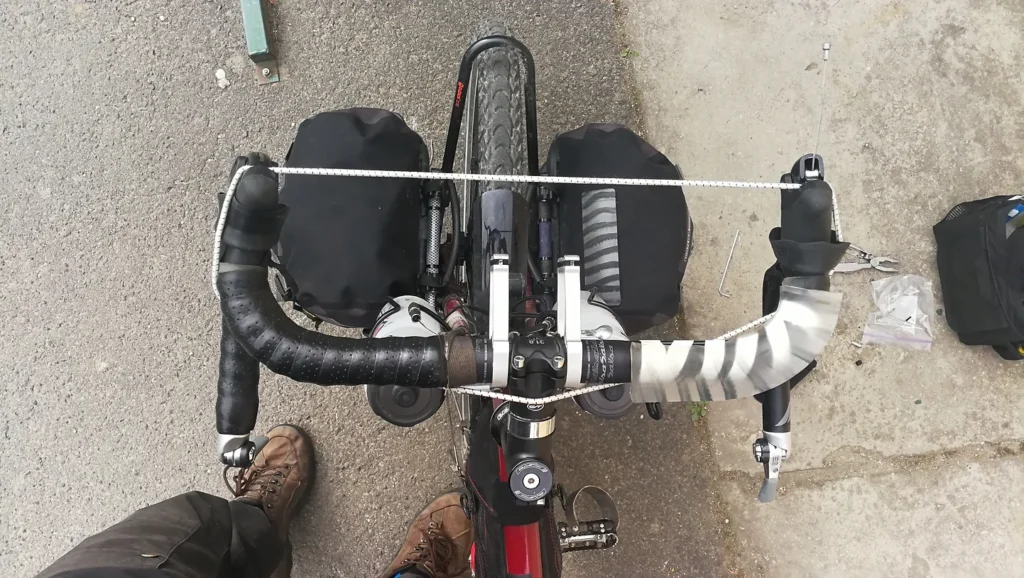
In the afternoon I cycled through Őrség National Park towards Slovenia. This area felt different than the rest of Hungary. In the small towns you see many bird houses on fences and people have benches in front of their houses to sit on the street as there is hardly any traffic.
This region radiates hard word, upholding traditions, and attention to detail.
When the ground is dry I can ride non-asphalted roads easily with my thick tires.
Time for a dinner on the road – they have truly delicious bell peppers in Hungary.
Getting water is easy in Hungary. Every village has a blue public water pump if you search for it.
In the evening I pitched camp in forest full of spring flowers:
How aware are we humans of our emotional blockades? Do we accept that they remain hidden in our subconsciousness or do we actively search for them by feeling deeper into our consciousness?
We always have the choice.
Having emotional blockades is called being human – you have some, and so do I. They are normal and natural and I think they are also wise teachers when we decide to listen what they have to say.
The deeper story which helps us grow, the story of our life … it seems to be written more in the space of feelings than words.
In the morning I rode southwest to Őriszentpéter in the heart of the national park:
I spend my last Hungarian money on fruit. Good thing something was sold despite Easter weekend as today was Good Friday – I felt hungry.
Hungary, thank you for reminding me that emotional blockades are normal and necessary to grow. Sitting in my storm-shaken tent on mount Kékes I realized that I wanted to have more feeling-time in my life and to be less cognition-focused – leaving my laptop, action cam, and camera behind felt right. But life is an individual journey and I definitely don’t have something to say that necessarily applies to you, dear reader … feel yourself.
